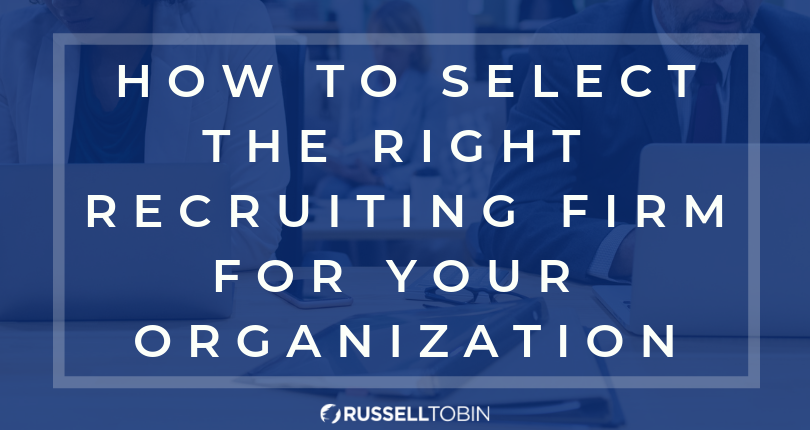In a world where unemployment is effectively zero, the amount of companies hiring outnumbers the amount of people actively looking. Because of that, recruiters both internally and externally are in high demand. However, since the barrier to entry in recruiting is minimal the challenges or stresses associated with “Which firm should we use for this search” is at an all-time high.
Now I might be biased because I believe Russell Tobin is the greatest recruitment firm there is, however, I would be remiss and a total hypocrite if I believed we were the best at everything. In fact, there are several things we do well, and several things we don’t do well. This is common with many firms, so one asks the questions, how can you find, filter, and make sure you select the most appropriate recruitment agency for your company’s needs.
- Recommendations
The first step I’d suggest is to ask for recommendations from the people who know the space and have used recruiters for their own search personally or when hiring in the past. The one caveat I’d like to add is to make sure you are drilling down to something as closely correlated as possible. I don’t advise that you ask the technology leader if your search is around sales, nor asking your West Coast Marketing lead for a Miami based administrative job. Recruiters, even the absolute best ones, are extremely niche in the types of companies they work with, locations, and job functions for which they support.
- Research
If step one is done properly, step two might not even be required. However, recruitment firms aren’t static which means the recruiter who placed “Susan” in a sales role last February might not even be at that same recruitment agency which could drastically change your mind set on a partnership. Plus, when done correctly it’ll arm you with even more questions for when you reach out to the recommended firms. Good places to look are LinkedIn, Glassdoor, Google Reviews, and of course the company’s website. On the website piece, it’s a good idea to explore and investigate. If they reference clients, ask yourself the following questions:
Are the clients listed similar in size? Do they operate in a similar industry? Are the jobs posted on the company’s website closely connected to the one you are about to pitch?
- Vetting and Qualifying A Short List of Recruiters
Assuming steps one and two are done properly, you should have a list of 3-6 companies to reach out to, screen, and decide which one is best for YOU. The assessment on which company to use should begin from the first email or call you make. After all, the journey you are taking is like the initial step a candidate will take when dealing with this company/recruiter so you should feel warm and fuzzy. If the company you reached out to is short or off-putting, rest assured they will probably be giving off that same vibe to the candidates they will interacting with while and are a representation of your company. If possible, aim for an in-person meeting or video conference. Remember, this company or person will be representing your firm so you should not take this step lightly. I don’t know about you, but if I was writing a check to somebody north of $10,000, I’d probably want to at least look them in the eye and shake their hands.
During the meeting or call, here are a handful of questions to ask:
- Could you give us an overview of the company you work for?
Yes, it’s vanilla but it also starts to showcase how they will pitch their own firm. Remember, they will be selling your company so if they can’t sell their own brand, please do NOT move to phase two.
- How do you fit into the company/what is your specialty?
This is the recruiter’s opportunity to showcase how closely their work meshes with the project or search in question. Beware of overly generic or broad answers. Think about this… some law firms and hospitals have thousands of professionals, but all have a specific focus or niche. Would you hire a Mergers & Acquisitions attorney who works with media companies to do your financial services company’s tax work and expect the same results? Would you hire a back surgeon to repair your knee? No. For that reason alone you should make sure the recruiter has a focus and that it’s in sync with your needs. We recommend that you focus or inquire about the industry, location, job function, and level for which they specialize in.
- How do you identify and surface candidates?
A loaded question, perhaps, but this should give you an idea of where they will look and what message they will send. Beware of the company that vomits up stats about a database or network of people. That might play some value but a better story or question that needs to be answered is “Why would a candidate listen or respond to your email/call versus mine or another recruiter.”
- What are similar firms you’ve worked with or searches you’ve done in the past 12 months?
To me, this is a must. If they can’t answer this then MOVE ON. Like question # 2, these searches should be as closely correlated to the one you are conducting as possible. At the end of the day, recruiters are revenue driving professionals, so they may “yes” you to death with the hopes of figuring it out later.
- May we contact a firm or candidate you’ve worked with and placed?
The silver bullet. If they answer the prior question with a comforting response, ask to validate the experience of both the candidate and/or recruiter. Be wary of the “that search was confidential” or “We can’t disclose our clients.” That might be the one in 10 case but if they are truly a specialist, they should have a list of 10-100 happy clients, not just one. Since I’m an analogy guy (if you couldn’t already tell), would you hire somebody to redo your house that couldn’t reference or show you another house they’ve done? To quote Kevin McCalister “I don’t think so.”
- Retained, Contingent, or RPO – what type of method or pricing do they recommend for this search or project?
- Retained Search– this will usually be the norm for director level or higher searches ($150,000 base salary and up) but not always needed. If a retainer is proposed, it’s usually broken down into an upfront fee and succession fee (when completed). If you are certain you are picking the right firm, then go this route. It creates a mutually beneficial partnership and a “we are relying on you to get this job done mentality.”
- Contingent– this type of method is usually used when a firm is getting an influx of candidates, but they aren’t sure they are getting the right type or enough of what is needed to get the person quickly. In short, the opportunity cost of not having this person is high, so the quicker they can find somebody the better. It’s also used in a scenario where companies are partnering with more than one search firm. Whatever you do, do not go in with the mentality of “we’ll use everybody.” That’s a dated methodology and will result in massive confusion on candidate representation, candidate experience, compensation and will without a doubt reveal issues later in the process. Plus, your better firms won’t make it a priority as it’s not a mutually beneficial relationship. It reminds me of the old saying “When it’s everybody’s responsibility, it’s nobody’s responsibility.” Pick one to two firms max, then if one or both can’t deliver, remove and add another within the following week(s).
- Recruitment Process Outsourcing (RPO/Project Based)– this comes in handy when a firm is looking to hire an abundance of people, wants to get as aggressive as possible on pricing, and take a more project focused approach. Usually this comes in the form of an upfront or rolling monthly retainer and some type of completion fee or agreed terms of success (ie. We’ll place 10 people in the first 90 days).
How much will this cost me?
Ok, I’ve used the silver bullet term, so let’s call this the golden bullet. Let’s face it, if you’ve gotten to this point you must feel pretty good about partnering with the company or recruiter you are in conversations with. Please, don’t go through all the previously mentioned steps and fall out of your chair when they quote you 25-30%. A highly recognized firm with an area of focus that aligns exactly with your needs should be realized and more importantly, appreciated. If you’re trying to compare the one-person operation in “Nowhere-USA” who’s only performed 2 human resource searches to the company that resides in your area of need and has placed hundreds over the year, don’t. The latter should be and most likely will be more expensive as the value and speed for which they will deliver on is tenfold what the person in “Nowhere-USA” will give.
At the end of the day, you should select a partner you are comfortable working with, has expertise in the area(s) you are hiring within, and has a strong reputation in the market amongst both clients AND candidates. Price may be a factor, but it shouldn’t be the end-all be-all. You are hiring people who will shape the future and potentially transform your company. Now is NOT the time to make decisions strictly based on price or not do your due diligence—after all the future of the world your company, depends on it.
Ben Jaksich is a Director with Russell Tobin and Associate, a global recruitment firm and is based out of New York.
Ben and his team specialize in working with media and technology firms that are in growth mode and recruit sales, marketing, product, technology and administrative professionals. This team has completed thousands of projects ranging from sales build outs to leadership and global management searches. They pride themselves on providing the highest level of service possible, while acting as a trusted advisor to the clients they work with.
Feel free to email Ben with questions or comments atben.jaksich@russelltobin.com

 Helping the
Helping the Specialized
Specialized Industrial
Industrial Healthcare
Healthcare MSP & Contingent
MSP & Contingent Innovative
Innovative Business
Business








